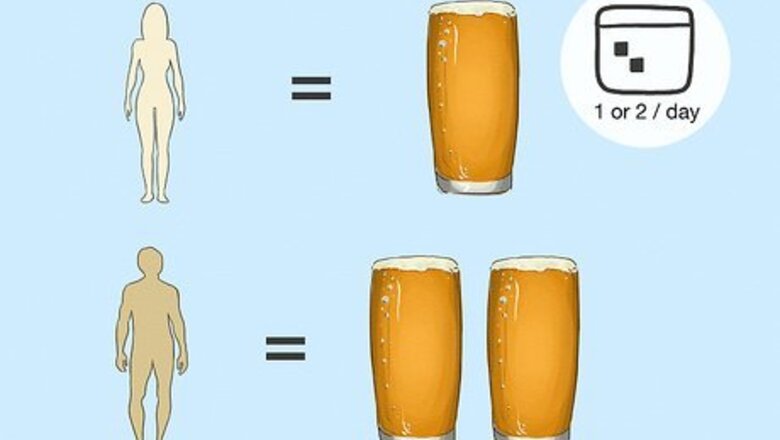
views
X
Trustworthy Source
Centers for Disease Control and Prevention
Main public health institute for the US, run by the Dept. of Health and Human Services
Go to source
Limiting Alcohol Consumption
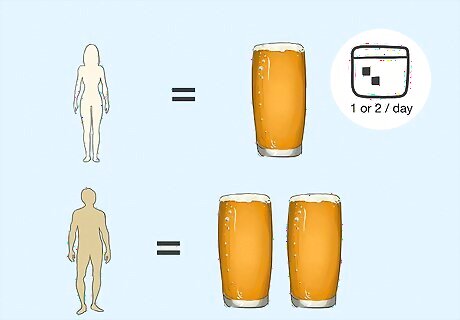
Drink only 1 or 2 alcoholic beverages a day. To drink in moderation, health experts recommend no more than 1 alcoholic beverage a day for people assigned female at birth and 2 alcoholic beverages a day for people assigned male at birth. In this context, 1 alcoholic beverage means any drink that contains 0.6 fl oz (18 mL) of pure alcohol. Generally, this equates to 12 fl oz (350 mL) of beer, 8–9 fl oz (240–270 mL) of malt liquor, 5 fl oz (150 mL) of wine, or 1.5 fl oz (44 mL) (a "shot") of distilled spirits. The recommended limit is lower for people assigned female at birth because they tend to have a smaller body size than people assigned male at birth, and their bodies break down alcohol more slowly. This doesn't mean having only 1 or 2 alcoholic beverages a day is "safe." It only means that your risk is significantly lower than it would be if you were a heavier drinker. Any consumption of alcohol increases your risk of developing cancer and other health conditions.

Schedule the days during the week when you'll drink. Look at your week ahead and identify specific days that are okay to drink. Limit this to 2 or 3 days out of the week. On the other days, don't consume any alcohol at all. For example, if you normally go out with your friends to a bar or club on Saturday night, you might schedule that as one of your drinking days. That means you probably shouldn't drink on either Friday or Sunday. But you might go to a Thursday Happy Hour at the local drinking hole.
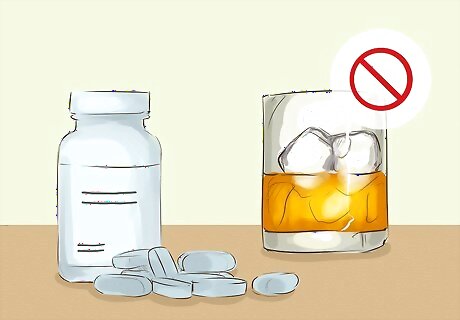
Avoid alcohol completely if you're taking any medication. Medications used to treat chronic health conditions can increase not only the inebriating effects of alcohol but also your risk of cancer. Talk to your doctor about how your medication interacts with alcohol. With some medications, it might be permissible to occasionally have a drink or two. However, if you're currently undergoing any kind of cancer treatment, you should stay away from alcohol entirely. If you've been treated for cancer in the past, talk to your doctor before consuming alcohol. It's possible that drinking alcohol could cause your cancer to come back. While this doesn't have anything to do with acetaldehyde exposure specifically, you should also abstain from alcohol if you are pregnant or trying to get pregnant or have a health condition, such as liver disease, that can be made worse by drinking.
Reducing Production of Acetaldehyde
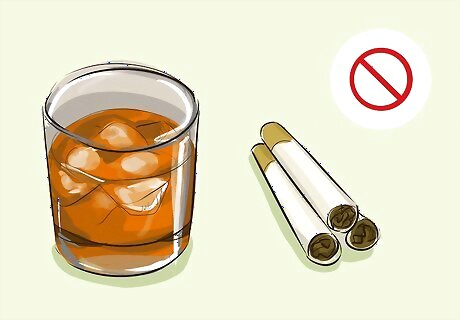
Stay away from tobacco smoke while drinking. Tobacco smoke contains acetaldehyde that can enter your body when you're exposed to secondhand smoke, even if you're not smoking yourself. When you smoke, you absorb even more acetaldehyde. Alcohol might also increase the cancer risk associated with smoking by helping cells that line your mouth and throat more easily absorb the carcinogenic chemicals in cigarette smoke. Smoking may also increase your risk of alcoholic pancreatitis, which irreversibly damages your pancreas and can put you at greater risk for developing pancreatic cancer.
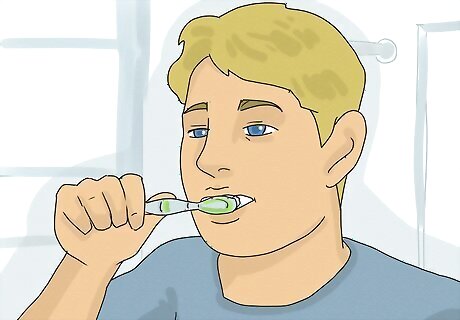
Brush your teeth before and after drinking alcohol to decrease acetaldehyde. While there haven't been many scientific studies on this, there are a few that suggest brushing your teeth before consuming alcohol decreases the amount of acetaldehyde produced in your saliva. Brushing your teeth after drinking also helps flush any acetaldehyde in your saliva, so your body doesn't have to break it down. Brushing your tongue and rinsing your mouth with mouthwash can also be beneficial if you're trying to reduce your exposure to acetaldehyde. Just make sure you're using an alcohol-free mouthwash.
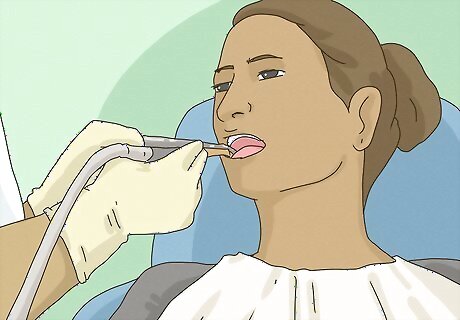
Maintain good oral hygiene overall. Going to the dentist regularly and getting any tooth decay or gum disease treated promptly might also reduce the production of acetaldehyde in your mouth. In general, scientific research shows that if you have poor oral health, you tend to also have more acetaldehyde in your saliva when you drink. Poor oral hygiene may also leave you more vulnerable to cancers of the mouth and throat, which exposure to acetaldehyde would only exacerbate.
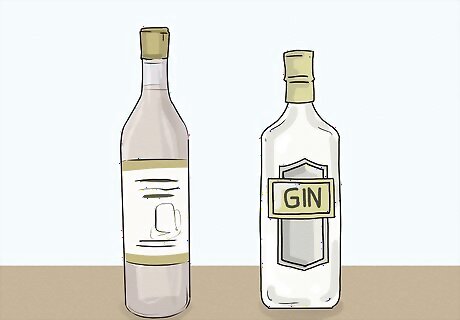
Choose drinks such as gin and vodka with lower acetaldehyde levels. While your body produces acetaldehyde when breaking down alcohol, alcoholic beverages also contain different levels of acetaldehyde. Clear, non-flavored spirits, such as gin and vodka, tend to have less acetaldehyde than dark, fruity drinks, such as brandy or sherry. Regular beer tends to have lower acetaldehyde content, though higher than clear spirits. Wine, on the other hand, has relatively high acetaldehyde content. Acetaldehyde content of alcoholic beverages isn't usually listed, but you can look up the content of your favorite drink online to get more specific information.
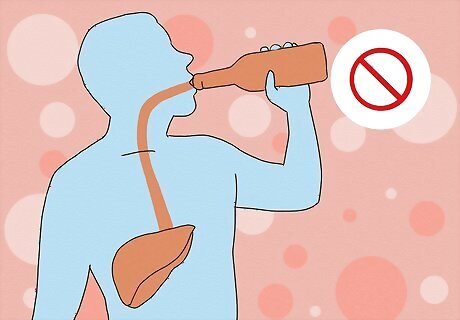
Avoid drinking to the point of intoxication. The acetaldehyde produced in your body is broken down mostly in your liver. However, drinking more than your liver can process results in a buildup of acetaldehyde. Over time, this can significantly increase your risk of cancer. Some research has shown that many of the symptoms associated with being drunk might actually be a symptom of acetaldehyde buildup. If you feel yourself starting to get tipsy, stop drinking alcohol immediately and start drinking water. That will help your body break down the acetaldehyde.
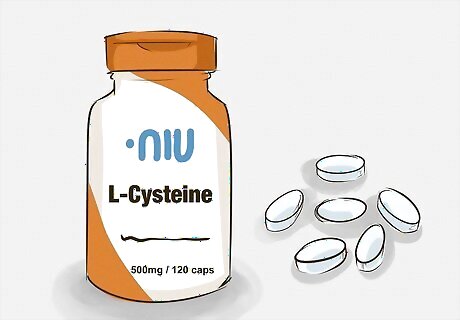
Take L-cysteine tablets to reduce acetaldehyde in your saliva. You can order L-cysteine tablets online or buy them wherever nutritional supplements are sold. Taking these supplements before you drink can reduce the levels of acetaldehyde in your saliva, which might also reduce your risk of developing cancer as a result of acetaldehyde exposure. Make sure you're getting L-cysteine, not the similar-sounding N-acetyl-L-cysteine (NAC). NAC is a precursor of L-cysteine and does have antioxidant properties. However, it isn't beneficial in reducing acetaldehyde.




















Comments
0 comment